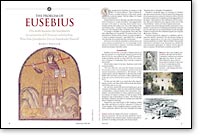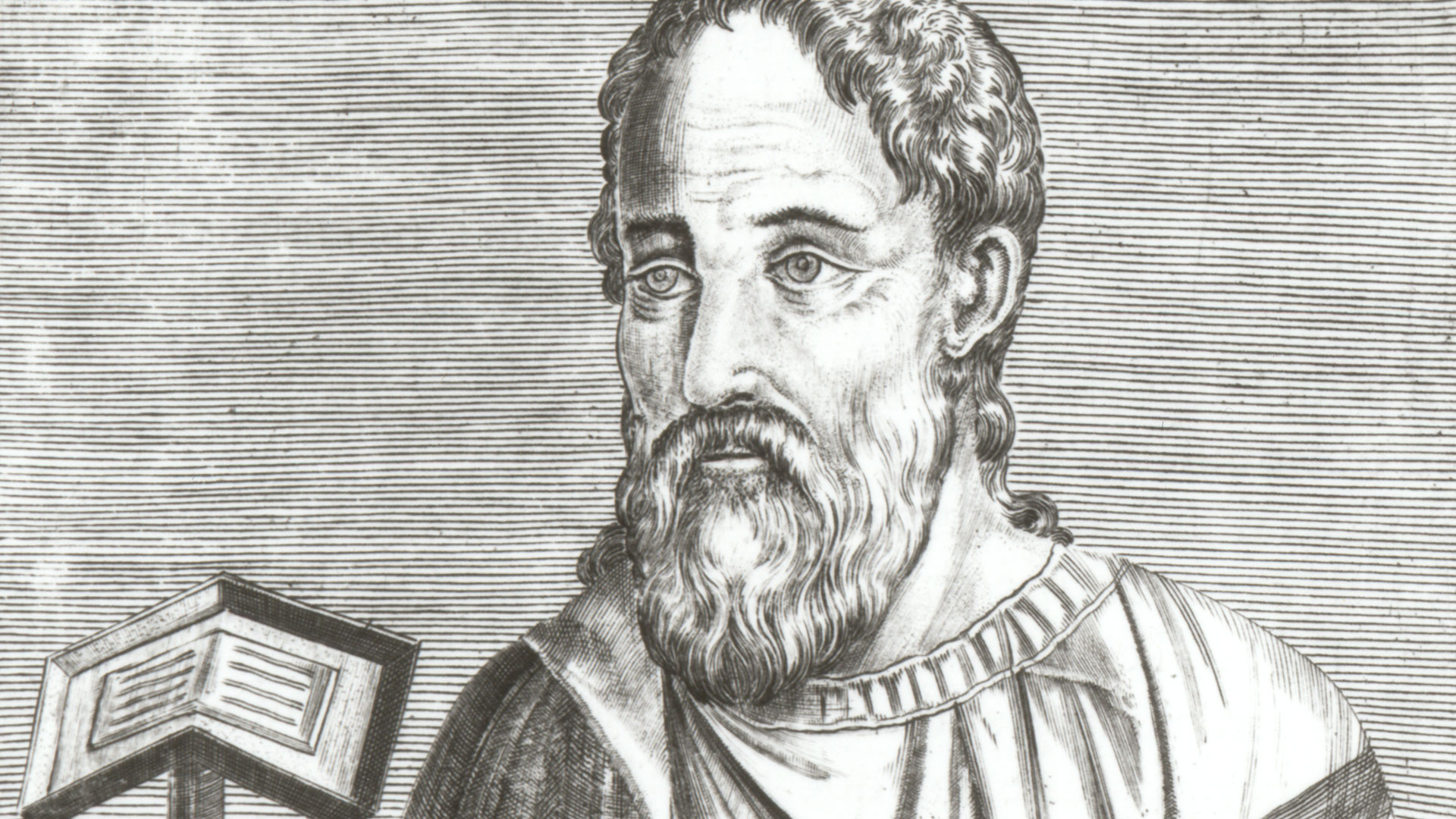
Many people know Eusebius of Caesarea as the "Father of Church History." But as Robert M. Grant, a modern historian of the early church period, provocatively asked, "Did the Father of Church History write history?"
Jewish historian Doron Mendels describes Eusebius's Church History as a "media revolution" and suggests that, because of his style of weaving short entries into a broader scheme, the author was "one of the fathers of the journalistic genre." Another writer concludes that Eusebius was "less a historian than a mediator of knowledge."
Or perhaps a mediator of propaganda. This is the man who called Emperor Constantine "most beloved by God," described the fourth-century church as being brought to "a state of uniform harmony," and called Jews "a people who had slain the prophets and the Lord himself."
However one evaluates Eusebius's achievement, his work remains foundational for our knowledge of the church in its first three centuries. And this foundation stands firm despite noticeable cracks.
Ground zero
Eusebius was not only a recorder of history, but one of the key players at a significant turning point for the church. His era was marked by the "Great Persecution" under Diocletian and his co-rulers (303-311), the conversion of Emperor Constantine (312), and the council of Nicea (325).
About many events of his time, Eusebius could write as an eyewitness:
"We saw with our own eyes the houses of prayer thrown down to the very foundations, and the divine and sacred Scriptures committed to the flames in the market-places, and the shepherds of the churches basely hidden here and there, and some of them captured ignominiously, and mocked by their enemies" (Church History 8.2.1).
Yet the one who told us so much about the church's history and his own times did not tell us much about himself. Neither did anyone else.
He was born around 260 and presumably grew up in Caesarea of Palestine, where he came under the influence of Pamphilius, a learned teacher from Alexandria. Pamphilius, a devoted student of Origen, gathered an impressive library of Origen's writings, as well as copies of the Scriptures and commentaries on them. This library and the library of Bishop Alexander of Jerusalem provided the basis of Eusebius's learning.
Pamphilius was imprisoned in 308. Eusebius visited him often, and the two wrote five volumes of A Defense of Origen together. When Pamphilius died as a martyr, Eusebius, in gratitude, added to his name Pamphilii, becoming "Eusebius [son or disciple] of Pamphilius."
Eusebius's moderate stance on Arianism (a Christology denounced as heresy at Nicea) earned him temporary excommunication by a synod at Antioch in 324 or 325, but his zealous support of Constantine put the biggest blot on his legacy. Expounded in the celebratory Life of Constantine, this awed admiration also appears at the end of the Church History—where, to be fair, it makes some sense.
Eusebius had lived through terrible persecution. Constantine's conversion to Christianity promised to end such horrors and begin an era unprecedented church strength. Eusebius's support for the redeemed regime was a logical, albeit naive, reaction.
Eusebius enjoyed the emperor's confidence and became the family's chronicler. He also became bishop of Caesarea, apparently in 313, the year Constantine and Licinius issued the so-called "Edict of Milan" that granted toleration to Christians. Later, Eusebius was offered the more prominent episcopacy of Antioch, but he chose to stay in Caesarea. He died there sometime around 340.
Fighting for the faith
With his great passion for learning, Eusebius became an accomplished exegete, theologian, apologist, orator, statesman, and, of course, historian. But while he is best known for his historical work, one could argue that he was above all an apologist. His biblical works respond to problems in the text of Scripture, and his historical works argue for the truth of Christianity.
One of Eusebius's major apologetic works, Preparation of the Gospel, uses quotations from Greek authors to refute the mythology, oracles, and philosophy of paganism. Another apologetic work, Proof of the Gospel, shows that Christianity continues the religion of the Old Testament patriarchs and fulfills Judaic prophecy.
Apologetics motivated Eusebius's early historical work, the Chronicle, as well. In it Eusebius lines up the principal events of universal and sacred history in order to prove that the Jewish people were older than other peoples. The works in praise of Constantine—the Life of Constantine, Praise of Constantine, and Constantine's Address to the Assembly of the Saints—may be considered historical works but also have an apologetic thrust.
Holy history
His Church History shares a missionary purpose with Eusebius's more explicitly apologetic writings, but it abounds with historical details. The opening words state Eusebius's six interests:
"It is my purpose to write an account of the successions of the holy apostles;. …
"to relate the many important events that are said to have occurred in the history of the church;
"to mention those who have governed and presided over the church in the most prominent parishes and those who in each generation have proclaimed the divine word either orally or in writing;. …
"to give the names. … of those who through love of innovation have run into the greatest errors;. …
"to recount the misfortunes that immediately came upon the whole Jewish nation in consequence of their plots against our Savior;
"and to record the ways and the times in which the divine word has been attacked by the nations and to describe the character of those who at various periods have contended for it in the face of blood and tortures, as well as the confessions that have been made in our own days, and finally the gracious and kindly succor that our Savior has afforded them all."
Eusebius later adds a seventh interest: the canon of the Scriptures. Yet he discusses none of these themes in the first of his 10 books.
Eusebius begins his Church History by describing the divine nature of the pre-existent Christ and the "scattering of the seeds of true religion" among human beings from the beginning of time. Many people throughout history rejected this divine teaching, but it was always available. This point was crucial to Eusebius because it answered a significant question from pagans: If Christianity is the only true religion, why was it so late in coming to the world?
Furthermore, the affirmation that Christianity began at Creation was central to Eusebius's theology of history. To bolster his claim that God's plan reached its climax in Christ, he had to trace that plan back through all time. On this basis, he could show how God continued to work through the church as well.
Eusebius wrote the History for ordinary Christians and interested non-Christians. This broad audience was not interested in doctrinal questions, so Eusebius gives such questions little attention. Instead, he concentrates on what would have popular—and enduring—appeal: sensational tales of martyrdom, juicy tidbits about famous leaders, lively quotations, and personal reflections.
Weaknesses and strengths
Eusebius had many defects, both as a writer and as a historian. He assumed, inaccurately, that the early church looked just like the church he knew. He displayed no sense of doctrinal or institutional development, especially in the Latin West, a region about which he knew little.
Eusebius can also be accused of whitewashing what he did know. As he introduced accounts of persecution in his day, he stated that he was including only what would be profitable:
"We shall not mention those who were shaken by the persecution nor those who in everything pertaining to salvation were shipwrecked. … But we shall introduce into this history in general only those events which may be useful first to ourselves and afterwards to posterity" (Church History 8.2.3).
Other complaints about Eusebius include his inattention to coherent narrative, his occasionally careless use of sources, and of course his belief that Christianity and the Roman state belonged together. But this negative picture can be exaggerated, and modern readers can be grateful for what Eusebius left us.
Whatever may be said about Eusebius's inability to organize his materials, he nonetheless had keen insight into themes that would have abiding interest for future generations. Who can forget the scenes recorded by Eusebius?
The apostle John fleeing the bathhouse upon finding Cerinthus, "the enemy of the truth," there.
Justin Martyr in a philosopher's cloak preaching the Word of God.
Polycarp confessing his faith before the governor: "Eighty-six years I have served Christ, and he has done me no wrong; how can I blaspheme my king who saved me?"
Blandina, the slave girl, hanging on a stake as if on a cross, but inspiring her fellow martyrs, "who saw the One who was crucified in the form of their sister."
Origen's father admiring his sleeping boy as one in whom the divine Spirit was enshrined.
Eusebius did not perfect the discipline of church history, but he took the crucial first step of considering world events from a Christian perspective. It is a tribute to his accomplishment that such scholars as Rufinus, Socrates Scholasticus, Sozomen, and Theodoret continued his pursuit—though none attempted to rewrite what he had written. For centuries, historians only took up where he left off.
Everett Ferguson is a distinguished scholar in residence at Abilene Christian University. His credits include editing Encyclopedia of Early Christianity and writing Early Christians Speak.
Copyright © 2001 by the author or Christianity Today/Christian History magazine. Click here for reprint information on Christian History.











